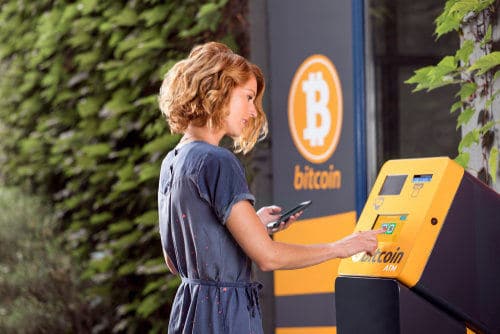Bitcoin Automated Teller Machines, known as BTMs for short, are one of the few ways to buy Bitcoin instantly. But are Bitcoin ATMs safe?
The Pros: Buy Bitcoin Instantly
On the plus side, a Bitcoin ATM lets you buy Bitcoin (and occasionally sell it) in exchange for cash, with either a very rapid or no verification process at all. Depending on the verification process, this can make for an anonymous Bitcoin purchase which preserves the purchaser’s financial privacy. BTMs are also a way for those without access to bank accounts to get into Bitcoin.
On the downside, the ability to buy Bitcoin anonymously—once the biggest selling point of BTMs, is slowly being phased out. And Bitcoin ATMs tend to have high fees, low limits, and a somewhat variable and unpredictable level of service quality between the many different machines and locations. In other words, BTMs tend to be a mixed bag.
Some machines are well-maintained, always well-funded, and situated in secure locations with round the clock access. Other machines are poorly-maintained, frequently out of bitcoins or cash, and situated in less salubrious areas or inside venues with inconvenient operating hours. It’s often hard to know before visiting a BTM exactly what to expect, which can lead to some significant difficulties, especially when traveling.
One question about BTMs that we often hear, particularly from newcomers to the crypto space, is: are Bitcoin ATMs safe? The initial purchase of bitcoins can be a somewhat fraught experience, full of unknowns. It’s therefore a natural question for them to ask, and a good one. In this article, we’ll give our best assessment of the level of security offered by the typical BTM.
Are Bitcoin ATMs Safe? Physical Security
Just like using a regular ATM, you have to beware of suspicious characters lurking about. Criminals may target people visiting BTMs, as they know they’ll be carrying at least some cash. While most Bitcoin ATMs have cameras, and many are located inside shops or malls where guards and other security measures are present, this is still something to watch out for.
As BTM operators don’t want their machines to vandalized, broken into or stolen, they’ll usually place them only in areas they consider secure. Furthermore, BTM operators will usually empty their BTMs of cash regularly. Also, because Bitcoin is virtual, there’s no way to forcibly extract coins from the devices, which reduces their attractiveness to thieves—or at least well-informed thieves who know how the machines work.
Despite the sensible placement and low cash storage levels of most BTMs, there’s no absolute guarantee of safety in a public space. If a BTM is located in an area with an especially high crime rate, consider avoiding it or at least visiting it only when accompanied. And one good rule of thumb to minimize the risk of using a BTM is not to carry excess cash while doing so.
Fraud
Perhaps you’re worried that the BTM itself may rob you by not dispensing Bitcoin once you’ve paid? While this concern is understandable, it’s a fairly unlikely scenario. As BTMs are installed in static locations and operated by known parties, any device which defrauded customers would be reported and most probably removed or disabled in short order.
Therefore, if you find an operational BTM, the chances are that it doesn’t have a history of defrauding clients and won’t start with you. To the best of our knowledge, there have been no cases of a BTM deliberately defrauding clients.
To keep the risk of fraud to an absolute minimum, you can conduct your initial BTM trade for only a small amount of value and then build up to larger trade values incrementally.

It’s worth noting that BTMs face a higher risk of fraud from customers than the other way around. A gang of four thieves in Canada used double-spend attacks against the vulnerable BTMs of a particular company to steal up to $150,000. Such attacks work only against BTMs which dispense cash for bitcoin without first requiring confirmation from miners. It’s likely that BTM operators will alter their policies to prevent such attacks in future.
Mobile Wallet Security
One final security aspect to consider when making use of a Bitcoin ATM is the safety of the wallet you use to receive your bitcoins. In most cases, you’ll use a mobile wallet on your smartphone or tablet. Such wallets are appropriate for the convenient storage and usage of the small amounts of bitcoin generally purchased from a BTM, but not ideal for the long-term storage of funds.
The hardware and operating systems of mobile devices are not designed with security as a priority, so such devices are usually far easier to hack than a standard PC. You can improve the security of such devices by storing your wallet’s private key on a hardware wallet (HW).
However, spending from a HW-secured mobile wallet requires the presence of the HW, which exposes the device to theft or loss. As physical attacks are the weakest aspect of HW security, it’s best to use a HW which is reserved for your mobile wallet and only holds low-value amounts – don’t expose your main HW which holds your entire crypto stash to the possibility of theft or loss!
At the end of the day, it’s not that Bitcoin ATMs aren’t safe, it’s that they serve a very niche purpose. Of course, we at Coinmama may be biased: we think that the easiest way to buy Bitcoin instantly is online!



